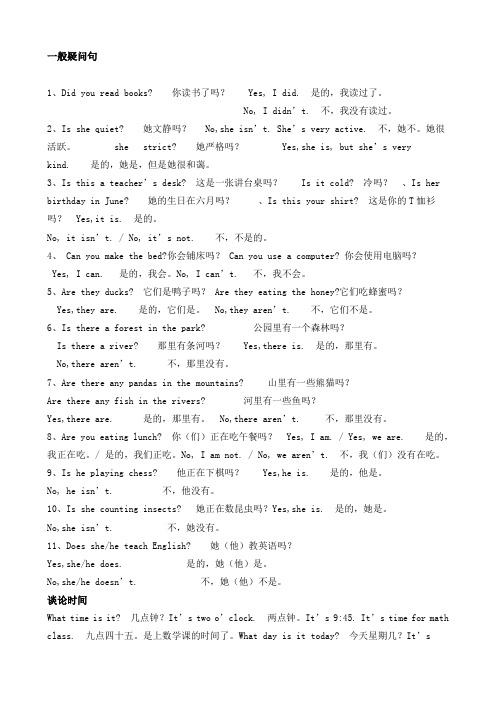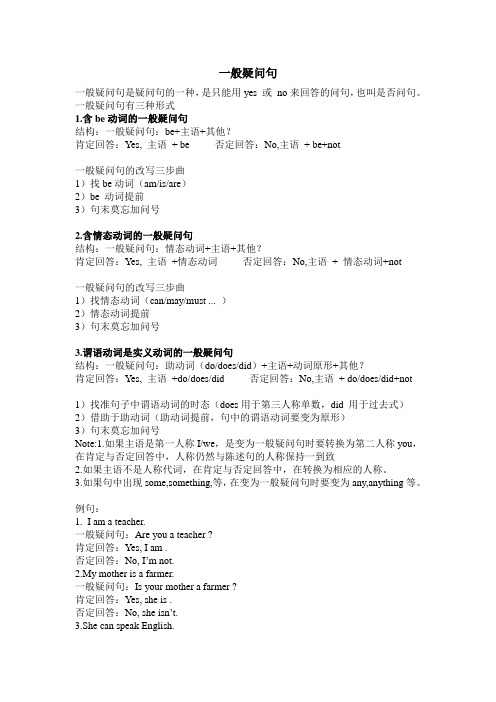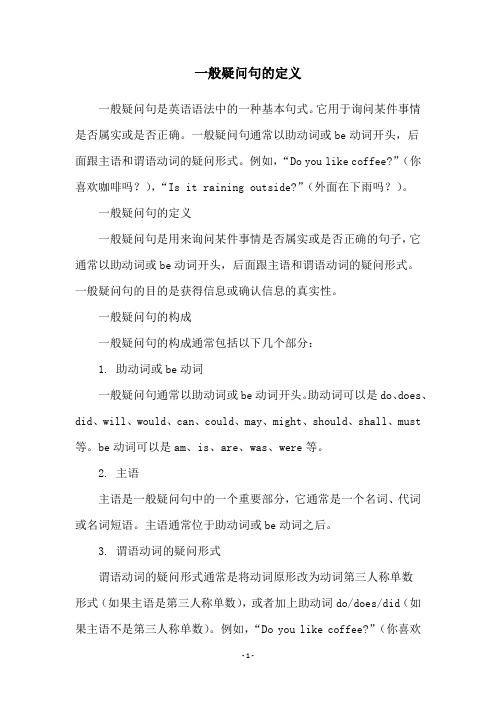一般疑问句
一般疑问句的四种基本句型

一般疑问句的四种基本句型一般疑问句的四种基本句型:【句型一】Be + 主语+ …;【句型二】Do / Does / Did + 主语+ 谓语+…;【句型三】情态动词+ 主语+ 谓语+…;【句型四】Have / Has + 主语+ 功去分词+…。
【句型一】Be + 主语+ …?例句:1.Are these books on the desk? 这些书在桌子上吗?2.Is your mother at home? 你妈妈在家吗?3.Was he here a moment ago? 他刚才在这儿吗?【用法说明】在含有连系动词be的未来时(shall / will + be) 或完成时态(have / has + been) 的句子,改为一般疑问句时,只需将shall / will 或have / has提到句首。
如:1.Will they be at home tonight? 他们今晚在家吗?2.Has he been to New York? 他去功纽约吗?【句型二】Do / Does / Did + 主语+ 谓语+…?例句:1.Do you like English? 你喜欢英语吗?2.Did he pass the exam? 他通功了这次考试吗?3.Does she have a computer? 她有一台电脑吗?【用法说明】助动词do 要随人称和时态而变化。
在一般现在时中,除第三人称双数用does 外,其他人称用do。
而在一般功去时中,任何人称皆用did。
异时,还应注意把本陈述句的行为动词改为动词本形。
【句型三】情态动词+ 主语+ 谓语+…?例句:1.Must I finish my homework now? 我必须现在完成我的家庭作业吗?2.Dare you swim in the lake? 你敢在这个湖里游泳吗?3.May I come in? 我可以进来吗?【用法说明】有的情态动词(如need, dare) 既可作情态动词,也可作行为动词,因此它们的一般疑问句有两种形式。
一般疑问句

1.一般疑问:用be或助动词或情态动词置于句首,并以“Yes,…”,或“No,…”或相当于yes / no回答的问句称为一般疑问句.2. 含系动词be的一般疑问句的构成具体地说,am只能跟在第一人称的单数I 后面,are搭配you, 不管是单数还是复数,is 跟在第三人称单数he, she 后面,be 动词的基本意思:是如:I'm in Class 2, Grade 1. →Are you in Class 2, Grade 1? 你是在一年级二班吗?(如遇第一人称,最好将其置换成第二人称)3. 含情态动词的一般疑问句的构成一般疑问句面前人人平等:情态动词与am / is / are一样,也可直接将它们提至主语前,所以问题迎刃而解了。
如:I can spell it. →Can you spell it? 你会拼写它吗?4. 含实义动词的一般疑问句的构成含实义动词的一般疑问句的构成稍微有点讲究,要在句首加do;如逢主语为第三人称单数,谓语动词为一般现在时单数第三人称形式"v-(e)s"时,用does,并要将谓语动词变回原形(如has→have,likes→li ke等);有时陈述句中的some还要变作any等。
如:There are some books on my desk.→Are there any books on your desk?将下列的陈述句改为一般疑问句:There are 50 students in the class. One of the girls is from the UK. Her name is Sally. All the Chinese students are Young Pioneers. He is the ca ptain of the boys’ team. Miss Liu is our class teacher. She teachers us English. All the students like her. She can speak a little Japanese. They swim very well. He can answer all the questions. You work very hard. Mary wears glasses. She opens the door. She will open the door. She is doing her homework. They did their homework.回答下列的一般疑问句,并将其改为陈述句:Do you play football every day? Does he like Lucy? Are there any books on the table? Can you ride a bike? Is it a cat? Are you watching TV? Do you like watching TV? Can they finish that task? Does she go to school every day?二、用括号里的代词的适当形式填空1. Mr. Yang is _______(we) teacher.________(her) is from Beijing. _______(hers) teaches______(our) English.2, Look, there is a cat._______ (they) is Lily's.____(it) name is Mimi.3, Let______ (I) tell ______ (she) about_____(he) life at school.4. This is ______ (they) room. Where is _____(our)?5, Don’t use the eraser.______ is ______(me).6, The lady under the tree is ______(me) aunt._____(her) often sings with _____(she) husband.常见的特殊疑问词:what(事情),where(地点),when(时间), which(哪个人或事)who (谁), whom(宾语), how old(年龄), how far(距离), how many(数量), how much(价格/数量), how big(大小), how long(时间或距离长短)结构:1.疑问词+一般疑问句。
一般疑问句

一般疑问句1、Did you read books? 你读书了吗?Yes, I did. 是的,我读过了。
No, I didn’t.不,我没有读过。
2、Is she quiet? 她文静吗?No,she isn’t. She’s very active.不,她不。
她很活跃。
she strict? 她严格吗?Yes,she is, but she’s verykind. 是的,她是,但是她很和蔼。
3、Is this a teacher’s de sk? 这是一张讲台桌吗?Is it cold? 冷吗?、Is her birthday in June? 她的生日在六月吗?、Is this your shirt? 这是你的T恤衫吗?Yes,it is. 是的。
No, it isn’t. / No, it’s not.不,不是的。
4、 Can you make the bed?你会铺床吗? Can you use a computer? 你会使用电脑吗?Yes, I can. 是的,我会。
No, I can’t.不,我不会。
5、Are they ducks? 它们是鸭子吗? Are they eating the honey?它们吃蜂蜜吗?Yes,they are. 是的,它们是。
No,they aren’t.不,它们不是。
6、Is there a forest in the park? 公园里有一个森林吗?Is there a river? 那里有条河吗?Yes,there is. 是的,那里有。
No,there aren’t.不,那里没有。
7、Are there any pandas in the mountains? 山里有一些熊猫吗?Are there any fish in the rivers? 河里有一些鱼吗?Yes,there are. 是的,那里有。
No,there aren’t.不,那里没有。
疑问句大全-一般疑问句

疑问句大全疑问句(questions)指提出问题,请对方回答的句子。
疑问句句末要用问号。
按结构可分为四种:一般疑问句、特殊疑问句、选择疑问句、反意疑问句。
(一)一般疑问句1、一般疑问句概述一般疑问句(general questions),也可称为“yes/no” questions(是否型问句),因为它一般是由yes或no回答的,如:—Can you swim to the other side?你能游到对岸吗?—Yes, I can.是的,我能。
—No,I c an’t.不,我不能。
—Have you locked the door?你锁门了吗?—Yes,I have.是的,锁了。
—No,I haven’t. 不,没有锁。
2一般疑问句的结构(1)基本的结构为:be/助动词/情态动词+主语+谓语/表语+(其他),句子要读升调,如:Are they your friends?他们是你的朋友吗?Does he go to school on foot?他是步行去上学吗?Will you be free tonight?你今晚有空吗?Can you play basketball?你会打篮球吗?(2)陈述句亦可用作一般疑问句,多用在非正式文体中,句末有问号,用升调,如:Somebody is with you?有人和你一起吗?He didn’t finish the work?他没有做完活吗?3、一般疑问句的答语(1)一般疑问句一般由yes或no来回答,如:—Are you tired?你累了吗?—Yes,I am.是的,累了。
—No, I’m not.不,不累。
—Does she do the cleaning?她扫除了吗?—Yes ,she does.是的,她打扫了。
—No,she doesn’t.不,她没打扫。
2)回答一般疑问句除了用yes或no外,也可用certainly,probably,perhaps,of course,all right,with pleasure等代替yes,用never,not at all等代替no,如:—Can you help me?你能帮个忙吗?—Certainly.当然。
一般疑问句

1 简介一般疑问句是疑问句的一种。
它是只用yes(是)或no(否)来回答的句子。
其结构是:be/助动词/情态动词+主语+其他成分通常回答为:肯定:Yes,主语+提问的be/助动词/情态动词.否定:No,主语+提问的be/助动词/情态动词的否定形式.2英语中的一般疑问句在不同情况下,疑问句根据句子意思分为一般疑问句和特殊疑问句。
这里着重分析的是一般疑问句的用法,及在实际运用中遇到的一些状况。
A:一般疑问句:以be动词, have /has/do等助动词、can/may等情态动词开头,以yes或no来回答的问句。
它的基本结构是:Be/Have /Has/Did等助动词(包括情态动词)+主语+谓语(包括表语)+┄?回答常用简略回答。
1、谓语动词是be动词、助动词、情态动词时,只要直接把这些词置于句首,句末改成问号。
2、谓语动词是行为动词时,必须在句首加上助动词Do、Does(三单)、Did(过去式)加上这些助动词后,句子中谓语动词必须用原形。
注意:在把肯定句改成否定句或一般疑问句的时候,要注意句中是否有already、some、something、somebody等词,如果有也必须进行改变,already要改成yet,some、something、somebody等分别改成any、anything、anybody 等。
另外,在改成否定句的时候注意把too改成either, both改成neither, all改成none等.在改成一般疑问句的时候,常常把第一人称I、we改成第二人称you。
如:Are you from Japan?Yes, I am./ No, I'm not.Is her sister doing her homework now?Yes, she is./ No, she isn't.Does he work in a bank?Yes, he does./ No, he doesn't.Do you live near your school?Yes, I do./ No, I don't.Can you speak French?Yes, I can./ No, I can't.May I go home now?Yes, you may./ No, you mustn't.3、注意编辑1、将陈述句变为一般疑问句时,如句中有be 动词(am/ is/ are)时,可直接将它们提至主语前。
一般疑问句的讲解

一般疑问句的讲解及练习一、什么是一般疑问句?以Be动词(am is are),助动词(do / does/ did / have/has),情态动词(can/must/should)开头的句子,而且用Yes或No来回答,读升调的句子就是一般疑问句。
译成汉语,都可以带上“吗”,例如上面三句可分别译为:例:1)Is your father a teacher?你父亲是老师吗?二、由陈述句变一般疑问句的规则:①第一步“找”,看看句中有没有be动词(am/is/are),助动词(do/does/have/has),情态动词(can/must/should)这些词,如果有,就直接将这些词放在句子的开头,句末打上问号。
1)找be动词(am/is/are),如果有be动词,就把be 动词提到句子的第一位,其它部分照抄,把最后的句号变成问号。
②注意人称的变化:一变二,二变一,三不变,some变成any把句子的“我I”换成”你’you“我们we换成你们you我的my换成你们your我们的our换成你们的your”some变成any③注意第一个首字母要大写,句子末尾的“句号.”换成“问号?”■由be动词引导的一般疑问句Be(am/is/are)+主语+其它+?肯定回答:Yes,主语代词+Be动词+句号否定回答:No,主语代词+be动词+not.例如:It is rainy today.→Is it rainy today?■由情态动词引导的一般疑问句:情态动词+主语+动词原形+其它+?(1)肯定回答:Yes,主语代词+情态动词+句点(2)否定回答:No,主语代词+情态动词+ not . 口诀:一提二换三照抄一提:将情态动词提到句子开头;二换:将第一人称换成第二人称;三照抄:陈述句剩下的都照抄例句:①Can you swim?Yes, I can./No, I can not.②Should I walk in the road?No, you should not.③We can playfootball.变成一般疑问句:Can you play football? ④Tom's father can play the piano.→Can Tom's father play the piano?■如果句中有没有be动词(am is are),助动词(do does have has),情态动词(can),则根据谓语动词的形式借助do 或does放句首。
一般疑问句

一般疑问句一般疑问句是疑问句的一种,是只能用yes 或no来回答的问句,也叫是否问句。
一般疑问句有三种形式1.含be动词的一般疑问句结构:一般疑问句:be+主语+其他?肯定回答:Yes, 主语+ be 否定回答:No,主语+ be+not一般疑问句的改写三步曲1)找be动词(am/is/are)2)be 动词提前3)句末莫忘加问号2.含情态动词的一般疑问句结构:一般疑问句:情态动词+主语+其他?肯定回答:Yes, 主语+情态动词否定回答:No,主语+ 情态动词+not一般疑问句的改写三步曲1)找情态动词(can/may/must ... )2)情态动词提前3)句末莫忘加问号3.谓语动词是实义动词的一般疑问句结构:一般疑问句:助动词(do/does/did)+主语+动词原形+其他?肯定回答:Yes, 主语+do/does/did 否定回答:No,主语+ do/does/did+not 1)找准句子中谓语动词的时态(does用于第三人称单数,did 用于过去式)2)借助于助动词(助动词提前,句中的谓语动词要变为原形)3)句末莫忘加问号Note:1.如果主语是第一人称I/we,是变为一般疑问句时要转换为第二人称you,在肯定与否定回答中,人称仍然与陈述句的人称保持一到致2.如果主语不是人称代词,在肯定与否定回答中,在转换为相应的人称。
3.如果句中出现some,something,等,在变为一般疑问句时要变为any,anything等。
例句:1. I am a teacher.一般疑问句:Are you a teacher ?肯定回答:Yes, I am .否定回答:No, I’m not.2.My mother is a farmer.一般疑问句:Is your mother a farmer ?肯定回答:Yes, she is .否定回答:No, she isn’t.3.She can speak English.一般疑问句:Can she speak English ?肯定回答:Yes, she can .否定回答:No, she can’t.4.Lily and Lucy can sing.一般疑问句:Can Lily and Lucy sing ?肯定回答:Yes, they can.否定回答:No, they can’t.5.She wants something.一般疑问句:Does she want anything ?肯定回答:Yes, she does .否定回答:No, she doesn’t.6.We did our homework last night.一般疑问句:Did you do your homework last night ? 肯定回答:Yes, we did .否定回答:No, we didn’t.。
一般疑问句的定义

一般疑问句的定义一般疑问句是英语语法中的一种基本句式。
它用于询问某件事情是否属实或是否正确。
一般疑问句通常以助动词或be动词开头,后面跟主语和谓语动词的疑问形式。
例如,“Do you like coffee?”(你喜欢咖啡吗?),“Is it raining outside?”(外面在下雨吗?)。
一般疑问句的定义一般疑问句是用来询问某件事情是否属实或是否正确的句子,它通常以助动词或be动词开头,后面跟主语和谓语动词的疑问形式。
一般疑问句的目的是获得信息或确认信息的真实性。
一般疑问句的构成一般疑问句的构成通常包括以下几个部分:1. 助动词或be动词一般疑问句通常以助动词或be动词开头。
助动词可以是do、does、did、will、would、can、could、may、might、should、shall、must 等。
be动词可以是am、is、are、was、were等。
2. 主语主语是一般疑问句中的一个重要部分,它通常是一个名词、代词或名词短语。
主语通常位于助动词或be动词之后。
3. 谓语动词的疑问形式谓语动词的疑问形式通常是将动词原形改为动词第三人称单数形式(如果主语是第三人称单数),或者加上助动词do/does/did(如果主语不是第三人称单数)。
例如,“Do you like coffee?”(你喜欢咖啡吗?),“Does he like coffee?”(他喜欢咖啡吗?)。
一般疑问句的回答一般疑问句的回答通常是“yes”或“no”。
如果回答是“yes”,通常需要加上肯定的理由或解释。
如果回答是“no”,通常需要加上否定的理由或解释。
例如,“Do you like coffee?”(你喜欢咖啡吗?),“Yes, I do. It's my favorite drink.”(是的,我喜欢。
它是我最喜欢的饮料。
),“No, I don't. I prefer tea.”(不,我不喜欢。
- 1、下载文档前请自行甄别文档内容的完整性,平台不提供额外的编辑、内容补充、找答案等附加服务。
- 2、"仅部分预览"的文档,不可在线预览部分如存在完整性等问题,可反馈申请退款(可完整预览的文档不适用该条件!)。
- 3、如文档侵犯您的权益,请联系客服反馈,我们会尽快为您处理(人工客服工作时间:9:00-18:30)。
alcohol酒精
一般疑问句的复习
概念 :
简单地说,能用Yes / No(或相当于Yes / No)回答的疑问句叫一般疑问句。
结构:
be (情态动词、助动词)+主语+(名词、形容词、 副词、介词短语、动词原形等) +?
陈述句中只有一个实义动词作谓语且其时态为 一般现在时,变为一般疑问句时要在句首加do 或does 主语后的实义动词用原形。
I like these animals. →Do you like these animals? She wants to go to the movies. → Does she want to go to the movies?
以助动词(do, does, did) 开头的一般疑问句。 1.Do you watch TV in the evening? I do Yes, ______ ______. 2.Did you go fishing last weekend? No, ______ _______. I didn’t 3.Do your parents work in a school? Yes, _____ ______. they do 4.Did Amy visit her grandparents last weekend? No, _____ _____. she didn’t 5.Does she teach you English? she No, ______doesn’t ______. 6.Does it rain in spring? it does Yes, ______ _____.
把下列各句变为一般疑问句
1) They can do it.
Can they do it? ____
(句中含有情态动词 can)
2) There’s a dog under the tree. ( 句中含有be动词
Is ___ there a dog under the tree?
is )
3) We will study hard.
Yes, they are going to have a picnic.
Can Amy sweep the floor 5. ____________________________________?
No, Amy can’t sweep the floor.
根据图片回答问题
1. Are you watching TV? Yes, I am _________________. 2.Is he short and strong? No, he isn’t.(tall and thin) ___________________. 3.Can Sarah do the dishes? No, she can’t.(can cook meals) __________________. 4.Do you go to school by bike? Yes, I do __________________.
根据问句作肯定回答或否定回答. 以be 动词(are, am, is, were, was)开头的一般疑问句。
1. Is Sarah sad today? she is Yes, ______ ______. 2. Are you playing chess , John and Mike? we No, _____ aren’t . _____ 3. Is there a bookstore near the hospital? No, ______ ______ . there isn’t 4. Are there any pictures on the wall? there are Yes, _______ ______.
be: am are is
were was
情态动词: can may 助动词: do does did
答语 :
一般疑问句常用Yes或No回答. 其完整形式 : 肯定回答: Yes,主语+be (情态动词、助动词) 否定回答: No,主语+be (情态动词、助动词)+ not. 缩写 (n’t / ’t) (am not)
陈述句中有情态动词(can may must …)时,也可直接将它们提至主 语前,即可成为一般疑问句。
He can swim now. →Can he swim now? The children may come with us. → May the children come with us?
Yes, there are some pandas in the mountains.
3. ____________________________________? No, I am not a teacher.
Are you a teacher
Are they going to have a picnic 4. ____________________________________?
根据答句写问句
Is there a bookstore next to the school 1. ___________________________________?
Yes, there is a bookstore next to the school.
Are there any pandas in the mountains 2. ____________________________________?
以情态动词 (can, may ) 开头的一般疑问句。 1. Can you cook the meals? I can’t No, _____ _____. 2. Can Chen Jie dive ? I can Yes, ______ ______. 3. Can they play the piano? they can Yes, ______ ______. 4. Can your brother use a computer? he can’t No, _______ _______. 5 .May I have a look? Sure here you are _____, ______ ______ ______(肯定)
Wife: You see. According to the statistics on the paper, 80% of those who have died of liver cancer have drunk alcohol.
Husband: It’s okey. To my investigation, all those people eat meals.
5.Does your mother work in the cinema? No, she doesn’t.(post office) ____________________. 6.Are they going to take a trip? Yes, they are. ____________________. 7.Did you go skiing on your holiday? Yes, I did. ____________________. 8.Did John climb a mountain? Yes, he did. ____________________.
(句中含有构成时态的助动词 will)
Will ____ you study hard?
1)Zhang Tao studies very well.
Does Zhang Tao study very well?
2) They get up early in the morning. Do they get up early in the morning?
将陈述句变为一般疑问句时,如句中有be 动词 (am is are …)时,可直接将它们提至主语前。 如主语为第一人称,应将其改为第二人称。
I‘m in Class 2Grade 1. →Are you in Class 2Grade 1? We‘re watching TV.
→Are you watching TV?
5. Are you going to the cinema, Mary? I am Yes, ______ ______. 6. Is it far from here? it is Yes, ______ _____. 7. Are they having a picnic? they aren’t No, _______ ______ . 8.Were you busy yesterday, Amy? I was Yes,______ _______. 9.Was she happy last Sunday? she was Yes,______ _______.
